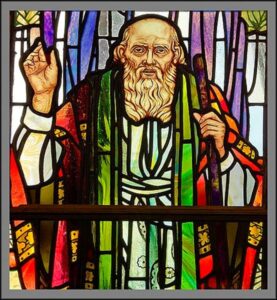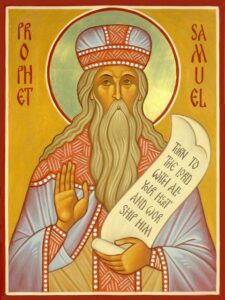The Prophet Seer Samuel | 20 August

Samuel was a man chosen by God for God, from his birth until his death. He faithfully served God and the nation of unified Israel as it transitioned from the time of judges to the rule of kings,in several important positions during his life, earning God’s favour because he knew how to obey.
Samuel is a miracle child, meaning ‘God has heard’, born to Elkanah and Hannah, in around 1100 BC. His mother Hannah did not have children. Her husband’s other wife, Peninnah, continuously scoffed and tormented her because she bore many children, but Hannah hadn’t had any. She was pleading with God to allow her to bear a son because she was barren. Her prayers had sincerity and strong faith. She made a vow to God that, if He would allow her to bear a son, she would give the boy to the service of God all the days of his life. God heard her prayers and opened her womb, blessed her with the child, thus she named the child, Samuel, because God listened to and answered her prayers.
His early life was spent at Shiloh in the service of the Lord, under priest Eli (1 Samuel 2: 11). Eli watched over him and clearly taught him the ways of the Lord. As a young boy in the tabernacle, it is likely he would run errands and do various tasks to serve the priests. Samuel grew in favour with God and men (1 Samuel 2: 26). He grew up willingly devoting himself to the Lord and took up the promise made by his mother as his own responsibility. He was called by the Lord to be a prophet, even as a child As he grew older (1 Samuel 3: 19-21) it was clear that Samuel was a prophet, as he acted as a messenger of the Lord and because of his upright character and God’s divine blessing on him.
The Lord was with Samuel as he grew up, and he let none of Samuel’s words fall to the ground (1 Samuel 3: 19)
Apart from being a ‘seer’, Samuel is also referred to as a ‘mouthpiece’, which suggests that he spoke in the name of God and as one whose mission was to transmit the word of God. He was also known to be ‘a man of God’ (I Kings 9: 10), indicating the special relationship Samuel had with his Creator. So the prophetic terms of ‘visionary’, ‘seer’, ‘mouthpiece’ and ‘man of God’ all came together in his person, thus indicating God’s intervention to promote Samuel as His prophet and to retain him in His service. He grew up in Shiloh and later lived in Ramah (1 Samuel 7: 17). However, his job as prophet and judge took him from city to city so he travelled a lot (1 Sam 7: 15-17).
Samuel was from the tribe of Levi, may be, he may have had Ephraimite blood, too (1 Ch 6: 33–38, 1 Sa 1:1). Samuel was the first of the prophets (Moses is both earlier and greater) and the last judge, who anointed the first two kings of Israel Saul and David. Samuel grew and faithfully conveyed messages from God, it became obvious that God was working through him. He grew in public esteem; the Lord upheld his word.

Samuel was a Nazarite, dedicated to the Lord as a child (1 Sam 1:11, Num 6: 1-21) and a was a priest. He begins his ministry serving the chief priest in the tabernacle (1 Sam 3: 1). Samuel made sacrifices on behalf of the people and offered intercessory prayers to God for them (1 Samuel 7:9.). Samuel urged the people to have a single heart, to look to the Lord in every need. As priest, judge, and prophet he settled disputes and unofficially led the nation and later he was also God’s appointed kingmaker. His anointing of Saul and David would have given legitimacy to these kings in the eyes of the people and showed that it was God’s doing.Samuel is remembered for his prayers, restored law, order, and regular religious worship in the land (1 Sam. 4:15–18; 7:3–17). Samuel is cited alongside Moses and Aaron as men who called on God and were answered (Psalm 99: 6). A key verse in the life of Samuel relates his words to King Saul: “But Samuel replied: ‘Does the Lord delight in burnt offerings and sacrifices as much as in obeying the voice of the Lord? To obey is better than sacrifice, and to heed is better than the fat of rams’ (1 Samuel 15: 22). Obedience to God’s Word must always be our top priority.
Samuel founded a prophetical school at Ramah to train young men in prophetic service. Samuel stood out as a man of integrity and uprightness, and perhaps most upright of Israel. He was very important to Israel’s transition from a loosely knit tribal alliance to a strong kingdom. Samuel’s life serves as an example for believers today. Key principles include his obedience to God, his faith (Hebrews 11: 32) and his willingness to intercede for others (Jeremiah 15: 1). He proclaimed the Word of God (1 Sam 9: 27) and that was the staple of Samuel’s ministry. Whatever God told him, he passed on to the people. Samuel was very faithful in the ministry that God gave to Him. He Continually exhorted Israel to follow the Lord (1 Sam 7: 3-12: 14-16, 12: 20-25). Samuel laboured throughout his life for the welfare of his people and served as Israel’s last judge before the people asked for a monarchy. Samuel served as a judge who focused on teaching and administering justice. The main theme throughout Samuel’s life is that God alone should receive the glory and honour. Samuel preached, judged, prayed, and guided Israel. He had was a very positive influence on Israel, which made a had a huge impact. Not only did he preach God’s Word, but he also kept people accountable to obey it.

At the beginning of his life Israel was led by judges but became a unified kingdom with a king later under Samuel’s guidance. The time-period of David to Solomon was Israel’s golden age when it was the most prosperous and powerful. When Samuel had completed the mission for which God had appointed him, the time came for him to bid farewell to this earthly life. He died and was buried in his courtyard at Ramah (Ramathaim), having gathered all the people of Israel around him (1 Kings 25: 1). He prophesied for forty years and finished his task 1,035 years before the advent of Christ. He is commemorated on 20 August.
0 Comments